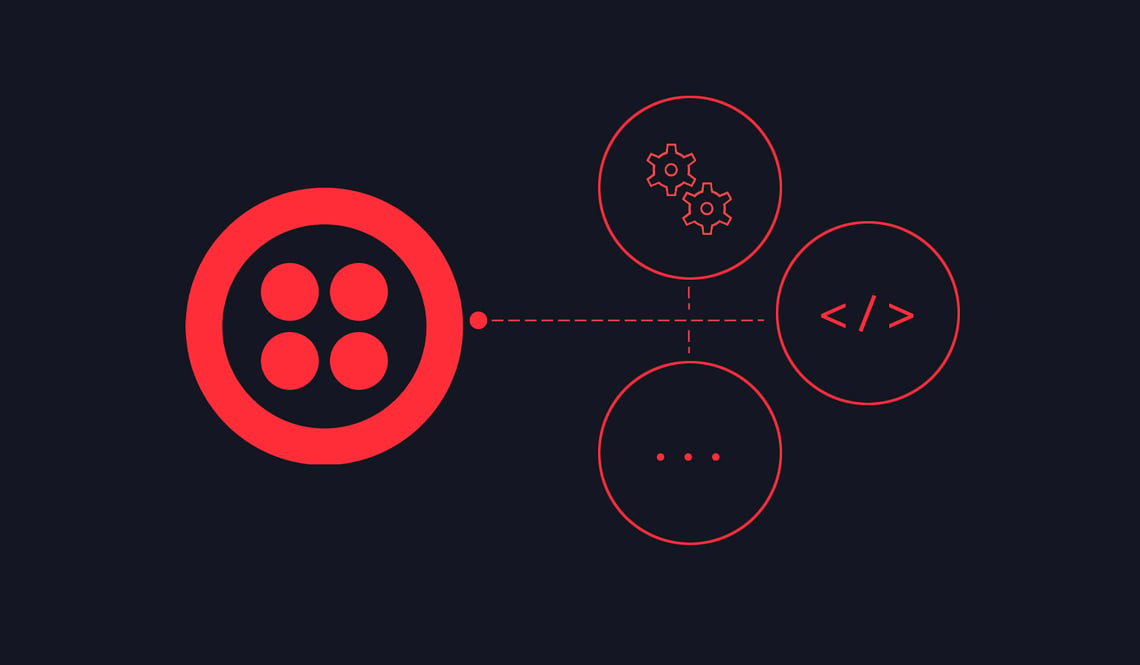Overview
Twilio’s Growth Engineering team needed to find a senior engineer (who knew APIs as well as they did) that could work on a new product feature for Twilio Code Exchange.
Their new beta feature, Quick Deploy, was added to Twilio CodeExchange to offer easy-to-configure applications that let their customers launch a Twilio project with no code. Quick Deploy required a dedicated engineer to author new apps, maintain a large set of existing apps (and make them easier to maintain), and test the feature’s overall value. The Growth Engineering team didn’t have enough time to hire a developer internally so they reached out to Codingscape to find one.
Background
Twilio delivers personalized communication that lets you connect with customers over a single API. More than 2 million developers around the world have used Twilio to unlock the magic of communications to improve any human experience. Companies like Lyft, AirBNB, and Netflix use Twilio to talk with their customers.
The project started in November 2020 with an original 6 month duration, but was extended through December 2021 due to meeting and exceeding original expectations. The engagement ended in December 2021 as an internal team took over maintenance of the project.
Problem
When Twilio added Quick Deploy to CodeExchange they quickly realized they needed another senior engineer to support it. Their CodeExchange aggregates code samples across the Twilio ecosystem of demos and apps and makes it easy for potential customers and customers to demo or deploy solutions.
The Quick Deploy feature was built to show potential Twilio customers what they could create with low-code through sample applications – like this Segment Quick Deploy App that can be used to generate events based on website behavior. The Twilio CodeExchange team knew they needed to spend at least 6 months building out their sample apps and tracking usage statistics to see if Quick Deploy really converted leads to customers. They already had 45 existing apps they needed help maintaining and these apps couldn’t share code (it was duplicated or modified slightly for each app) which was quickly turning into a maintenance nightmare.
It was clear to the Twilio CodeExchange team that they needed another skilled senior engineer to jump in and start working right away. There wasn’t enough time to hire a new full-time engineer or certainty about the continued need for a new position, so they had to get creative. That’s how they found Codingscape.
Solution
Once we talked with Twilio about their needs, we matched them with the ideal senior software engineer at Codingscape for the work. Jordan was already familiar with internal and external Twilio APIs, knew the app languages (Typescript, Javascript, and Cypress), and knew CI/CD with CircleCI and Github Actions.
Jordan started working directly with the Twilio Growth Engineering to build new sample apps for Quick Deploy. Over the course of a year he built 10 new sample apps for Quick Deploy, took ownership of maintaining 45 existing apps (including repo for all Quick Deploy apps), and built a Typescript code library for all 55 of the Quick Deploy apps. That code library proved valuable enough that another Twilio engineering team adopted it for their Runtime workflow.
As a Codingscape senior developer, Jordan was able to quickly get up to speed with Twilio’s teams to improve reliability, maintenance, and maintainability for all of the Quick Deploy code. His Typescript library was able to fix the duplicate code problem that was quickly making Quick Deploy unmanageable and he rewrote the whole repo to maintain coding standards. He also built out a robust automated testing system that allowed for validation and verification of community code before it was made available via CodeExchange.
After all of this work, other teams inside of Twilio trusted Jordan to help them prepare their applications to launch on the CodeExchange Platform. Jordan applied all of his expertise to build the Quick Deploy Segment app that would allow companies to send text messages to their customers based on custom event-based triggers (e.g. product added to website cart).
This collaboration between Jordan from Codingscape and Twilio’s Growth Engineering Team was shared by Twilio CEO, Jeff Lawson, at Twilio’s annual Signal Conference in November of 2021.
YOU MAY NEED TO KNOW
Engagement Details
Team Composition
- Product Manager
- Senior Full Stack Software Engineer
Duration
- Initial - 6 months
- Final - 13 months
Project Stats
- Builds 10 new API-heavy apps
- Maintain 45 existing apps (including repo)
- Build Typescript library for all 55 apps
Conclusion
One senior Codingscape engineer adds high value
This engagement is a great example of how a single Codingscape engineer can integrate with an existing agile software team and make an immediate (and long-term) impact. Jordan started with a 6-month engagement and because he met and exceeded original expectations (and worked so well with all the Twilio engineering teams), the duration was extended for a total of 13 months.
Sources
Technologies
- Typescript
- Javascript
- Cypress (Testing)
- CI/CD with CircleCi & Github Actions
- Internal & External Twilio APIs

